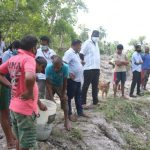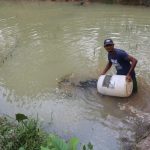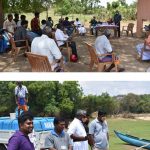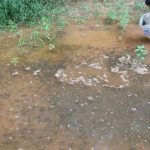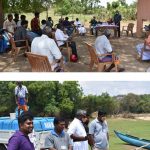“No one should die of Hunger-End Hunger by 2025”- Pope Francis
Caritas Sri Lanka –SEDEC is implementing the program “Addressing causes for poverty and ensuring food security for farming communities” by aiming to switch over to sustainable agricultural practices through development of Home gardens with the support of Caritas Norway/NORAD. This program is implemented in all 25 Districts of Sri Lanka through Caritas Sri Lanka network under the leadership of Rev. Fr. Mahendra Gunatilleke, National Director, Caritas Sri Lanka -SEDEC.
CSL has so far mobilized 13,353 subsistence farmer families from 525 villages and motivated them to cultivate their own home gardens by using sustainable agricultural techniques. Caritas National Centre in Colombo and the 13 DCs Island wide have conducted 2,035 Sustainable Agricultural training programs promoting organic home gardening and have been successful in establishing 13,353 domestic economic units. Upgraded unproductive home gardens and paddy lands to secure food supply throughout the year for the poor farmer families. The domestic economic units include cultivation of vegetables, fruits, herbal plants, yams, spices, live fencing, fire wood trees, trees for timber, grass, inland fisheries and rearing small scale livestock (poultry, cattle, goat, ducks, pigs, rabbits, turkey and bee keeping) enabling the participating farmer families to consume nutritionally balanced diets.
Inland fisheries also have been incorporated in to domestic food production system. Fish as nutritious food is generally acceptable to all regardless of region, religion, race, gender and age across Sri Lanka. Fish contributes substantially to the supply of macro- and micronutrients to humans, especially vitamin A and minerals from the different types of species. The contribution of the fisheries sector is vast from nutritional security perspective to poor and marginalized communities and thus cannot be ignored.
On March 19, the Government of Sri Lanka (GOSL) declared a partial shutdown of all ports and a nationwide lock-down. Disruptions to food distribution exists in some parts of the country but no food shortage is imminent in the short run; GOSL is working to deliver essential services and recommence essential trade and distribution knowing that agriculture supply chains have been disrupted. As a precaution to overcome any shortfalls in food imports, plans are underway to cultivate essential field crops domestically.
Our work to help the poor and marginalized communities defeat hunger has not stopped. The coronavirus has stopped some of us going to our workplace, but it hasn’t stopped our work.
Coinciding with these efforts, the Caritas Ratnapura constructed four Fish ponds at Nelugolla and Pathagama with the support of National Aquaculture Development Authority (NAQDA). Upon completion of construction of the Fish ponds at the respective places, fish fingerlings were laid to the ponds on 28th April 2020 under the leadership of Rev. Fr. Sanjeewa Peiris, Diocesan Director, Caritas Ratnapura. Mr. Sumindha Kularathne (Aquaculture Development Officer, Ratnapura District)) and officers of the Udawalawa Fish Breeding centre transported the fingerlings and briefed on the important aspects of fish pond culture. Mr. Sunil Fernando, Program and Administrative Officer of Caritas Ratnapura, Mrs. Sajeewani Elpitiya and Mr. Priyantha Gamage (Field Officers of the Food Security Program) also participated in the day’s program. Mrs. Sunethra Devage, Development Officer and Mr. Lalith Pushpakumara, Agriculture Research and Production Assistant of the area participated at this event. Four families will benefit from this activity.
Caritas Batticalo has stocked 40,000 fingerlings in to a selected tank (Kangani Kulam) located in Kachakodi-swamimalai area with the demonstration session conducted by NAQDA officials on 6th May 2020 with approval of the Divisional Secretariat, Police and Public Health Inspector. Rev. Fr. G. Alex Robert, Director, Caritas EHED Batticaloa, Mr. Kandasamy, Program Manager, and Field officers participated in the event.
This action will help to increase awareness on fish farming, fish production, availability, affordability, & purchasing capacity, and may lead to the increased consumption, implying that the role of fisheries in food and nutritional security is becoming indispensable.


